Ephesians 2:19-20 ESV
[19] So then you are no longer strangers and aliens, but you are fellow citizens with the saints and members of the household of God, [20] built on the foundation of the apostles and prophets, Christ Jesus himself being the cornerstone,
Earlier, I wrote on some matters arising from the way we have often described the fivefold ministry gifts. A central argument of that piece is that the Bible’s uses of these terms – apostle, prophet, evangelist, pastor, and teacher – are not as rigid as many modern church sermons suggest. On the contrary, these gifts seemed to be mutable roles God empowered believers to perform. In this piece, my focus is slightly different, although it remains on the ministry gifts.
As I have written in a few blog entries, Paul, our chief source on the ministry gifts, connects Jesus’ giving of the gifts to the conquest of Bashan and Hades, long-term foes of Yahweh, through his death, resurrection, and ascension. It was in that context that Paul says ministry gifts were given:
Ephesians 4:11-14 NRSV
[11] The gifts he gave were that some would be apostles, some prophets, some evangelists, some pastors and teachers, [12] to equip the saints for the work of ministry, for building up the body of Christ, [13] until all of us come to the unity of the faith and of the knowledge of the Son of God, to maturity, to the measure of the full stature of Christ. [14] We must no longer be children, tossed to and fro and blown about by every wind of doctrine, by people’s trickery, by their craftiness in deceitful scheming.
Apparently, these gifts, including “apostles,” were given at the same time following the ascension. All of them are necessary, it would seem, for building a well-nourished body. This raises a question: Were there not apostles before Jesus’ death? If our reading that Paul here claims that the ministry gifts were given after Jesus’ ascension is correct, then there are at least two levels of understanding “apostles.” There is a meaning of the term that refers to the people Jesus sends out. This will include the Twelve (Mark 6:7-13) and the Seventy-Two (Luke 10). Indeed, the same class of Greek words is used in these passages. The second level of meaning would be the Spirit-released kind that began at Pentecost.
But if this is the case, then there is a problem with a popular reading of the text quoted at the beginning, especially verse 20:
Ephesians 2:20 ESV
built on the foundation of the apostles and prophets, Christ Jesus himself being the cornerstone,
The question I want to investigate here is the identity of the “apostles and prophets.” I will argue that the prophets mentioned here are from the Old Testament. If, as mentioned en passant, Paul taught that all five ministry gifts are necessary for building up the church, it is doubtful that he would have also taught that only Christian apostles and prophets are foundational to the building of the Gentile church. Jesus did not begin with disbursing only the gifts of apostles and prophets, and then later releasing evangelists, teachers, and pastors. All the gifts were released simultaneously. So, if any gift was foundational, we should expect all to be. Moreover, it was the Evangelist Philip, not an apostle or a prophet, who first preached the gospel of Jesus in Samaria. This complicates the notion that only Christian apostles and prophets were foundational. So, how then can we read Paul’s words in Ephesians 2:20 in a way that makes the whole letter internally coherent? Below is a brief proposal.
First, we should note that when Paul wrote this letter, the Ephesian Church had already been established. So, when Paul says that the church was “built on the foundation of apostles and prophets,” it is unlikely that he meant that the other gifts—evangelists, pastors, and teachers—played no role in building that church. As it was then, so it is now: no Church survives or thrives without pastors and teachers. Someone might argue that the apostles could have done the pastoring and teaching. In that case, we should ask: if an apostle could take on the functions of teachers and pastors, why then would Jesus have given these other gifts, as Paul says in Ephesians 4? The Church would have been fine with just two, not five, gifts. This is a reason I think “apostles” here is best read in the broadest sense that means “those sent forth,” which, of course, includes all five gifts. So, “apostles” would be Paul’s shorthand language for human intermediaries and conveyors of divine message in the new order.
If this reading is correct, then the “prophets” in verse 20 are best understood as referring to Old Testament prophets. The following are a few reasons. First, Paul writes to the church in Rome:
Romans 1:1-4 ESV
[1] Paul, a servant of Christ Jesus, called to be an apostle, set apart for the gospel of God, [2] which he promised beforehand through his prophets in the holy Scriptures, [3] concerning his Son, who was descended from David according to the flesh [4] and was declared to be the Son of God in power according to the Spirit of holiness by his resurrection from the dead, Jesus Christ our Lord,
Paul says the gospel of God concerning Jesus was “promised beforehand through his prophets in the holy Scriptures”. (As we have argued elsewhere, the gospel of God predates the incarnation.) At the time Paul wrote this letter, the only scripture used by Jesus and all the believers was the Old Testament. Indeed, Paul makes this point clear by saying the gospel was promised “beforehand,” prior to the appearing of Jesus in the flesh. To borrow a Pauline phrase, revelations to Old Testament prophets form the foundation of the Christian message.
Similarly, Paul also writes to the Galatians:
Galatians 3:8 ESV
And the Scripture, foreseeing that God would justify the Gentiles by faith, preached the gospel beforehand to Abraham, saying, “In you shall all the nations be blessed.”
Of course, Abraham lived some 2000 years before the New Testament. Therefore, it is evident that the term “Scripture” here refers to the Old Testament. Also, Abraham is a prophet in the Bible (Genesis 12). Hence, we see that Paul taught that Old Testament prophets are foundational to the gospel of God concerning Jesus.
There now remains one wrinkle to smooth out for this argument to work. Paul later also writes this in the letter to the Ephesians:
Ephesians 3:4-6 ESV
[4] When you read this, you can perceive my insight into the mystery of Christ, [5] which was not made known to the sons of men in other generations as it has now been revealed to his holy apostles and prophets by the Spirit. [6] This mystery is that the Gentiles are fellow heirs, members of the same body, and partakers of the promise in Christ Jesus through the gospel.
Verse 5 presents a potential issue for my proposal. Paul says his “insight into the mystery of Christ” was not “made known to the sons of men in other generations as it has now been revealed.” It should now be evident that this does not imply the Old Testament prophets were unaware of the gospel. As we have already seen, Paul affirms that the Old Testament has much to say about the gospel. Instead, the point here is that Paul’s insight that Gentiles are fellow heirs and partakers of the promise in Christ was not known (in the same way?) to older generations. As we shall see shortly, this idea was known to some Old Testament persons. In any case, the potentially problematic point is that Paul says the mystery is now revealed to God’s holy apostles and prophets. Someone might read the time marker “now” as excluding Old Testament prophets, since “now” surely refers to the time of Jesus, from birth to ascension and the time of the early church. Can my proposal account for this observation? Yes, indeed. While I think “prophets” in this instance may include New Testament prophets, it certainly does not (and cannot) exclude Old Testament prophets. To ensure my point is clearly understood, we need to take a brief detour.
In ordinary usage, churchgoers generally assume that Malachi (in the Protestant Canon) marks the end of the Old Testament while Matthew begins the New Testament. This is, in fact, misleading. Strictly speaking, the new covenant in the blood of Jesus did not begin until the resurrection and the ascension. So, more than half of Matthew (and the other Gospel accounts) is, properly speaking, Old Testament stuff. Jesus was born and raised as a human under the old testament order of things. That is the point of Galatians 4:4. Also, Zechariah, John the Baptist’s father, was ministering in an Old Testament temple when he got news that he would have a son. Hence, John the Baptizer is also squarely an old testament prophet. With these details in mind, we can now seek to identify the “prophets” to whom God “now” revealed the mystery of Christ.
In his praise song to Yahweh after he regained the ability to speak, Zechariah had this to say:
Luke 1:73, 76-77 ESV
[73] the oath that he swore to our father Abraham, to grant us
[76] And you, child, will be called the prophet of the Most High; for you will go before the Lord to prepare his ways, [77] to give knowledge of salvation to his people in the forgiveness of their sins,
First, notice that Zechariah recognizes that the birth of his son is connected to the oath Yahweh swore to Abraham—an oath that includes the gospel, as Paul puts it in Galatians 3:8. Second, Zechariah prophesies that his son will “go before the Lord to prepare his ways.” As Mark makes clear, the “Lord” whom John later prepared the way for was Jesus (Mark 1). Apostle John records this about the Baptizer:
John 1:31, 33 ESV
[31] I myself did not know him, but for this purpose I came baptizing with water, that he might be revealed to Israel.”
[33] I myself did not know him, but he who sent me to baptize with water said to me, ‘He on whom you see the Spirit descend and remain, this is he who baptizes with the Holy Spirit.’
So, John the Baptizer was one of the prophets to whom the mystery of Christ was revealed, and he was, properly speaking, an Old Testament prophet. Indeed, John has more to say:
John 1:29 NRSV
[29] The next day he saw Jesus coming toward him and declared, “Here is the Lamb of God who takes away the sin of the world!
By declaring that Jesus takes away the sin of the world, not just Israel’s sins, Apostle John implies that the Baptizer understood Jesus’ ministry to ultimately include Gentiles, much like Paul’s claims about his insight into the mystery of Christ.
Furthermore, Luke 2 also mentions two other Old Testament prophets to whom Jesus, as the Christ, was revealed: Simeon and Anna. When the infant Jesus was presented at the temple as it was customary for Jewish children, Simeon received him and declared:
Luke 2:29-32 ESV
[29] “Lord, now you are letting your servant depart in peace, according to your word; [30] for my eyes have seen your salvation [31] that you have prepared in the presence of all peoples, [32] a light for revelation to the Gentiles, and for glory to your people Israel.”
Simeon, like the Baptizer, says Jesus was God’s salvation and a light for revelation to the Gentiles. Again, we see that this “Old Testament” figure connects Jesus’ messiahship to the salvation of Gentiles. Luke prefaces this passage with a clear connection:
Luke 2:26 ESV
And it had been revealed to him by the Holy Spirit that he would not see death before he had seen the Lord’s Christ.
So, Simeon knew that the infant Jesus was the Messiah of Yahweh he had been waiting for. In the same context, Luke introduces another prophet, Anna, who was 84 and constantly served at the temple:
Luke 2:37-38 ESV
[37] and then as a widow until she was eighty-four. She did not depart from the temple, worshiping with fasting and prayer night and day. [38] And coming up at that very hour she began to give thanks to God and to speak of him to all who were waiting for the redemption of Jerusalem.
She knew Jesus was the long-awaited redemption of Israel and, by implication, the world. As we pointed out elsewhere, Jesus had to be sent to Israel, in accordance to the gospel preached to Abraham, to save the whole world.
Now, I want to demonstrate that the immediate contexts of Ephesians 2 also strongly suggest the reading I have provided. In a language reminiscent of Galatians 3, Paul writes:
Ephesians 1:13-14 ESV
[13] In him you also, when you heard the word of truth, the gospel of your salvation, and believed in him, were sealed with the promised Holy Spirit, [14] who is the guarantee of our inheritance until we acquire possession of it, to the praise of his glory.
Paul here says that the Gentiles in the Ephesian Church are guaranteed to participate in “our inheritance.” This is astounding because “inheritance” is a familial legal term. The inheritance in question was once exclusive to the Israelites. In the theology of Galatians 3, Paul links the giving of the Spirit to the gospel preached to Abraham (Galatians 3:8, 14). So, what used to be an in-house Jewish affair has now incorporated Gentiles. The Spirit is the reason Gentiles can now inherit the promise. Paul continues:
Ephesians 2:11-12 ESV
[11] Therefore remember that at one time you Gentiles in the flesh, called “the uncircumcision” by what is called the circumcision, which is made in the flesh by hands— [12] remember that you were at that time separated from Christ, alienated from the commonwealth of Israel and strangers to the covenants of promise, having no hope and without God in the world.
Again, Paul stresses the Old Testament basis of the inheritance. Prior to the Gentiles receiving the Spirit, they were “alienated from the commonwealth of Israel and strangers to the covenants of promise” (12). The inheritance the Gentiles can now lay claim to belonged to the “commonwealth of Israel.” Also, though Yahweh is the creator of the universe, he was only Israel’s God until the giving of the Spirit to Gentiles. That is why Paul says the Gentiles are without God in the world before receiving Christ.
Paul further writes:
Ephesians 2:13, 18-20 ESV
[13] But now in Christ Jesus, you who once were far off have been brought near by the blood of Christ.
[18] For through him we both have access in one Spirit to the Father. [19] So then you are no longer strangers and aliens, but you are fellow citizens with the saints and members of the household of God, [20] built on the foundation of the apostles and prophets, Christ Jesus himself being the cornerstone,
Paul says that the Gentiles have been brought into the family of God through the blood of Christ. They now have access to the God of Israel through the Spirit. Hence, Gentiles are no longer aliens but members of the family of God that used to consist of only the descendants of Abraham. Then follows our text which says that Gentiles are built on the foundation of the apostles and prophets. Most definitely, whatever that church was taught was drawn from the Old Testament and delivered by apostles, the ones sent forth by Jesus including evangelists, pastors, and teachers. The point is worth reiterating: at that time, the only Bible used by Jesus and all the believers was the Old Testament. So, the Ephesian Church would have been built on the writings of the prophets and other portions of the Old Testament.
In conclusion, I think “holy apostles and prophets” was Paul’s language for what we might today phrase as “human intermediaries and conveyors of divine messages under the new and old covenants.” Paul did not have access to modern “Old Testament” and “New Testament” language. Though if he did, he would not have approved of that language. “Old Testament” was a pejorative, anti-Semitic, Christian invention intended to suggest that the Hebrew Bible was no longer (as) useful. Yet, this was the Bible of Jesus and all the early believers. The Jewish believers in Christ were highly unlikely to draw such a misleading demarcation. As the Gospel accounts show, the story of Jesus is a continuation of the story of Abraham. Post-resurrection, the risen Lord yet relied on the Hebrew Bible to open the eyes and hearts of confused disciples on the Road to Emmaus:
Luke 24:25-27 ESV
[25] And he said to them, “O foolish ones, and slow of heart to believe all that the prophets have spoken! [26] Was it not necessary that the Christ should suffer these things and enter into his glory?” [27] And beginning with Moses and all the Prophets, he interpreted to them in all the Scriptures the things concerning himself.
Jesus here asserts that Moses – that is, the Pentateuch – and the prophets had enough to say to identify the Messiah! The Old Testament is a necessary foundation for the Church of Christ.





2 Comments